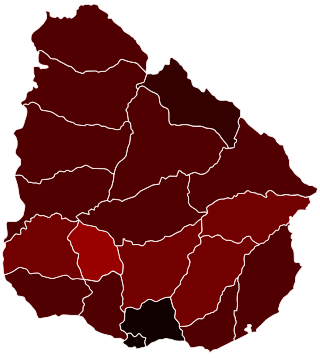
Ana Marina Arismendi Dubinsky is an Uruguayan teacher and politician of the Communist Party. She served as Minister of Social Development from 2005 to 2010, and from 2015 to 2020, in the first and second government of President Tabaré Vázquez.
Korean Uruguayans, numbering 130 individuals, formed the 19th-largest Korean community in Latin America as of 2005, according to the statistics of South Korea's Ministry of Foreign Affairs and Trade.

Paraguay and Uruguay established diplomatic relations on April 6, 1845. Paraguay has an embassy and a consulate-general in Montevideo. Uruguay has an embassy and a consulate-general in Asunción. Paraguay also has an honorary consulate in Punta del Este. Both countries were founding members of the Mercosur, and both are full members of the Rio Group, the Latin Union, the Association of Spanish Language Academies, the Organization of American States, the Organization of Ibero-American States, the Union of South American Nations, the URUPABOL, the Cairns Group and the Group of 77.

Uruguayans are people identified with the country of Uruguay, through citizenship or descent. Uruguay is home to people of different ethnic origins. As a result, many Uruguayans do not equate their nationality with ethnicity, but with citizenship and their allegiance to Uruguay. Colloquially, primarily among other Spanish-speaking Latin American nations, Uruguayans are also referred to as "orientals [as in Easterners]".

Ana María Olivera Pessano is an Uruguayan professor and politician belonging to the Communist Party – Broad Front. Since February 15, 2020 she serves as National Representative for Montevideo. Previously, she held the position of Deputy Minister of Social Development and Intendant of Montevideo, being the first woman to be elected to that position. Her mandate as Intendant ran from July 8, 2010, to July 9, 2015, when she was succeeded by Daniel Martínez.
Basque Uruguayans are citizens of Uruguay who are of Basque ancestry.

Immigration to Uruguay began in several millennia BCE with the arrival of different populations from Asia to the Americas through Beringia, according to the most accepted theories, and were slowly populating the Americas. The most recent waves of immigrants started with the arrival of Spaniards in the 16th century, during the colonial period, to what was then known as the Banda Oriental. Immigration to Uruguay is very similar to, if not the same, as immigration to Argentina.

Argentine Uruguayans are people born in Argentina who live in Uruguay. In 2010, there were over 10,000 Argentines living in Uruguayan territory.

Brazilian Uruguayans are people born in Brazil who live in Uruguay, or Uruguayan-born people of Brazilian descent.
Uruguayans in Spain are people born in Uruguay who emigrated to Spain. As of 2022, there are over 80,000 Uruguayans living in Spain, mostly in Catalonia.
Uruguayan Venezuelans are people born in Uruguay who live in Venezuela, or Venezuelan-born people of Uruguayan descent. Modern estimates put the figure of Uruguayans in Venezuela at ca. 9,000.
Uruguayan Chileans are people born in Uruguay who live in Chile, or Chilean-born people of Uruguayan descent.
Uruguayans in Sweden are people born in Uruguay who live in Sweden, or Swedish-born people of Uruguayan descent. As of 2013, there were over 4,000 Uruguayans living in Swedish territory.

Mexicans in Germany refers to the Mexican population in Germany and their German-born descendants.
Chilean Uruguayans are people born in Chile who live in Uruguay, or Uruguayan-born people of Chilean descent.
Dominican Uruguayans are people born in the Dominican Republic who live in Uruguay, or Uruguayan-born people of Dominican descent.
Venezuelan Uruguayans are people born in Venezuela who live in Uruguay, or Uruguayan-born people of Venezuelan descent.

Graciela Elena Bianchi Poli is a Uruguayan lawyer, notary, teacher, and politician of the National Party. She currently serves as Senator of Uruguay in the 49th Legislature. She is known for her interventions in constant confrontation with the opposition and for posting fake news on social media.

The COVID-19 pandemic in Uruguay has resulted in 1,038,774 confirmed cases of COVID-19 and 7,634 deaths.
The National Ballet of Uruguay is a Uruguayan ballet company that was founded in 1935 in Montevideo. It is the public body in charge of developing the professional classical ballet in Uruguay, it is under the administration of the Official Service of Broadcasting, Television and Entertainment (SODRE).











